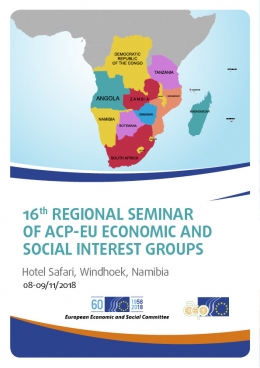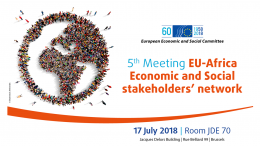European Economic
and Social Committee
AKP i Afrika
Od prve Konvencije iz Loméa (1975.) do Sporazuma iz Cotonoua (2000. – 2021.) partnerstva EU-a i zemalja AKP-a uređivala su odnose između EU-a i 79 zemalja Skupine afričkih, karipskih i pacifičkih država (AKP), koja je nedavno postala Organizacija afričkih, karipskih i pacifičkih država (OACPS).
Tijekom tog razdoblja EGSO se, zajedno s civilnim društvom zemalja AKP-a, borio za priznavanje ključne uloge nedržavnih aktera u razvojnom procesu sve dok se to nije postiglo Sporazumom iz Cotonoua, kojim se EGSO-u daje mandat za organiziranje aktivnosti i savjetovanja s „gospodarskim i društvenim interesnim skupinama zemalja AKP-a i EU-a” kako bi se prikupljala stajališta organiziranog civilnog društva i kako bi im se osigurala veća vidljivost.
Cilj je poticati razmjene i iznositi preporuke o pitanjima i politikama važnima za odnose zemalja AKP-a i EU-a te ih potom službeno upućivati čelnicima EU-a i zemalja AKP-a.
U praktičnom smislu, aktivnosti EGSO-a u području odnosa između EU-a i OACPS-a uglavnom se provode pod vodstvom zajedničkog Odbora za praćenje AKP-a i EU-a koji čine članovi EGSO-a i delegati koji predstavljaju skupine gospodarskih i socijalnih interesa iz zemalja AKP-a.
Odbor za praćenje AKP-a i EU-a održava redovite kontakte s predstavnicima civilnog društva zemalja AKP-a na različitim razinama putem:
- redovitih sastanka Odbora za praćenje AKP-a i EU-a,
- regionalnih seminara u zemljama AKP-a, koji predstavljaju forum za raspravljanje o temama od zajedničkog interesa s predstavnicima civilnog društva u raznim regijama,
- glavnih skupština gospodarskih i socijalnih interesnih skupina iz zemalja AKP-a i EU-a koje se održavaju svake tri godine u Bruxellesu.
EGSO također održava redovite kontakte s predstavnicima gospodarskih i socijalnih interesnih skupina Afričke unije u okviru zajedničke strategije EU-a i Afrike.
Konkretno, EGSO svake godine održava sastanke s grupom gospodarskih i socijalnih dionika Afrike i EU-a.
Već dugi niz godina EGSO održava redovite odnose sa Zajedničkom parlamentarnom skupštinom AKP-a i EU-a te na zasjedanjima Plenarne skupštine podnosi izvješća o njezinim aktivnostima.
EGSO je također u bliskom kontaktu s međunarodnim organizacijama poslodavaca, radnika, poljoprivrednika, zadruga i potrošača. Te organizacije imenuju predstavnike AKP-a koji će biti pozvani na sastanke koje organizira EGSO, uključujući i sastanke Odbora za praćenje AKP-a i EU-a.








